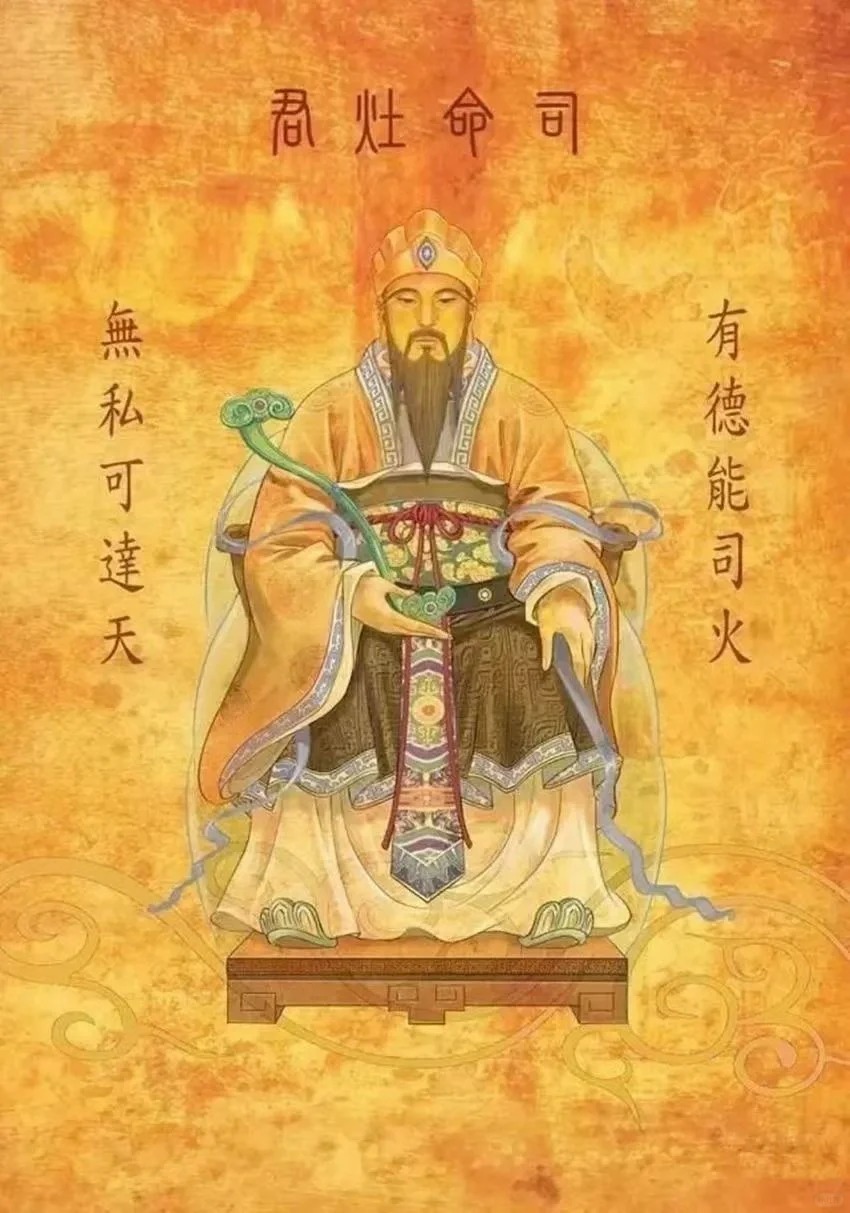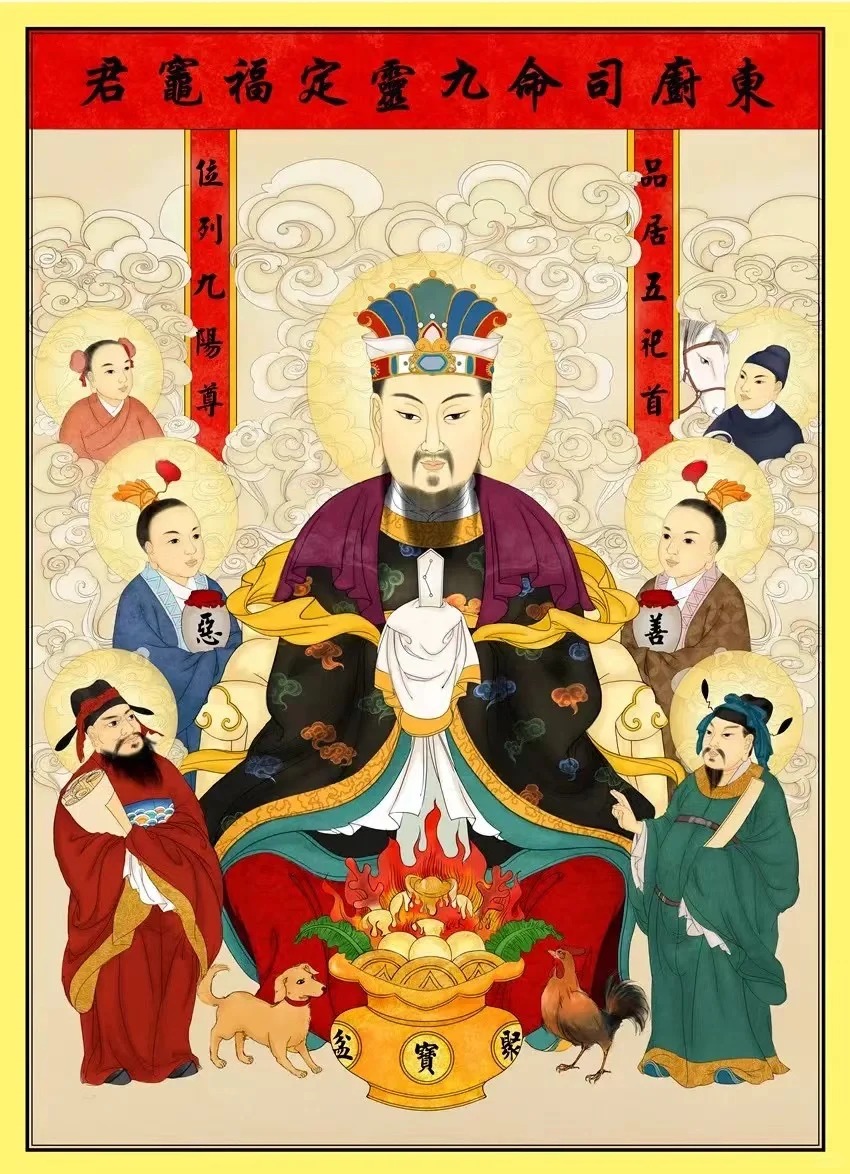The Origin and Evolution of the Kitchen God Worship and Ritual Traditions
The Kitchen God (Zao Shen or Zao Wangye)
The Kitchen God, also known as Zao Shen, Zao Jun, Zao Jun Siming, or Zao Shen Xingjun, is one of the most popular deities in traditional Chinese folk religion. In ancient times, almost every household had a shrine for Zao Wangye, with people referring to this deity as "Zao Jun Siming." According to legend, he was appointed by the Jade Emperor as the "Lord of the Stove and Guardian of the Eastern Kitchen," responsible for overseeing each household's stove fire, which led to his veneration.
The Kitchen God’s shrine was usually placed on the north or east wall of the kitchen, with a central image of the deity. In households without a shrine, the deity's image was sometimes pasted directly onto the wall. Some representations of the Kitchen God depicted him alone, while others included a male and female figure, with the female known as "Zao Wang Nainai" (the Kitchen Goddess).
Zao Shen is one of the most representative and widely revered gods in Han Chinese folk religion, embodying the people's wishes for warding off evil, preventing disasters, and attracting good fortune.
Historical Development
Zao Shen's full title is "Great High Lord of the Stove of the Eastern Kitchen of the Nine Heavens, Bestower of Blessings and Recorder of Virtue," but he is commonly known as "Zao Jun" or "Zao Wang." In Northern China, he is often called "Zao Wangye." He has also been referred to as "Siming Zhenjun" (True Lord of Life), "Lord of the Eastern Kitchen," or "Zao Wangfu Jun" (the Kitchen Lord).
The worship of Zao Shen originated as early as the Shang Dynasty and was recorded in the Zhou Dynasty’s rites, with some sources linking him to the son of Emperor Zhuanxu named Li. By the Qin and Han Dynasties, Zao Shen was considered one of the Five Household Deities (along with the Door God, Well God, Toilet God, and Hearth God), responsible for the family's safety and wellbeing. Besides overseeing household cooking, Zao Shen's key role was as a divine official sent by the Jade Emperor to observe and report on the moral behavior of each family. He is accompanied by two attendants, one carrying a jar for good deeds and the other for bad deeds, in which they record the family's actions. On the 24th day of the twelfth lunar month, known as "Farewell to the Kitchen God," Zao Shen returns to the heavens to report on the family's deeds to the Jade Emperor.
The offerings made to Zao Shen during his departure often included sticky and sweet foods, such as sugar melons, glutinous rice balls, maltose, and pig’s blood cake. These foods were meant to "seal" the Kitchen God’s mouth, ensuring that he would only speak well of the family when he returned to the heavens. A common saying is: "Speak sweetly, say good things, and bad words stay behind."
Function and Role
Initially, Zao Shen’s role was limited to managing food preparation. However, by the Eastern Jin Dynasty, he was also responsible for monitoring human behavior, recording sins, and reporting to the Jade Emperor. This concept expanded into a key belief that the Kitchen God influenced the family's fate.
Every year, on the 23rd or 24th day of the 12th lunar month, families would offer sacrifices to send the Kitchen God off to the heavens. It is believed that Zao Shen’s report influenced the family’s fortune for the coming year, and thus his favorable report was greatly sought after. On New Year's Eve, families would ceremoniously welcome the Kitchen God back, usually by putting up a fresh image of him in the kitchen.
Legends and Stories
According to legend, the Kitchen God was originally a mortal named Zhang Dan who was married to a virtuous woman named Ding Xiang. However, Zhang Dan fell in love with a courtesan named Haitang and abandoned his wife. In the end, Haitang squandered all his wealth and left him. Zhang Dan, having lost everything, became a beggar. One cold winter’s night, he begged for food at his ex-wife Ding Xiang’s home, where he was recognized. Overcome with shame, Zhang Dan crawled into the stove and died. Because he shared the Jade Emperor's surname, the emperor appointed him as the Kitchen God.
In other versions, Zao Shen was originally a god in charge of fire, who was later reassigned to oversee the household stove. His wife, known as Zao Wang Nainai, assisted him in his duties, and together they were worshiped as protectors of the home and family.
The worship of Zao Shen continues to this day in many Chinese communities, particularly in rural areas, where families still observe the tradition of offering sweet and sticky foods to ensure his favorable report to the Jade Emperor.
Brand Introduction: BuddhaPurify
BuddhaPurify is a brand deeply rooted in the rich heritage of Chinese traditional culture and Buddhist practices. Our mission is to offer a unique blend of ancient wisdom and modern elegance through our products, which are designed to enhance spiritual well-being, personal growth, and holistic health.
Foundation and Philosophy
Inspired by the timeless teachings of Buddhism and the profound traditions of Chinese culture, BuddhaPurify is dedicated to providing products that reflect the serene and enlightened aspects of these ancient philosophies. Our brand is built on the principles of mindfulness, purity, and spiritual harmony, aiming to bring balance and tranquility to our customers' lives.
Cultural Enrichment
We believe in the power of cultural enrichment and strive to educate and inspire our customers through the stories and meanings behind our products. Our brand seeks to bridge the gap between traditional spiritual practices and contemporary life, offering products that resonate with both ancient wisdom and modern sensibilities.
Conclusion
BuddhaPurify is more than just a brand; it is a journey into the heart of Chinese traditional culture and Buddhist spirituality. Through our thoughtfully curated products, we aim to support your quest for inner peace, spiritual growth, and a balanced life. Explore our collection and experience the harmonious blend of tradition and tranquility that defines BuddhaPurify.





